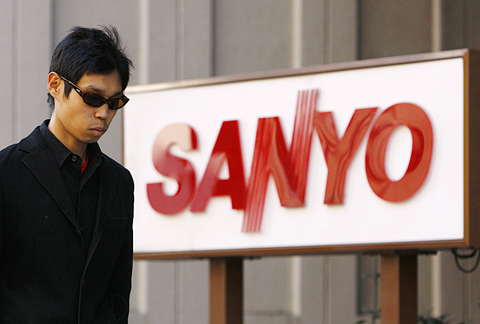Japan’s Panasonic Corp said yesterday it had cleared the way to acquire struggling Sanyo Electric Co for up to US$9 billion, forming an industry heavyweight amid the global downturn.
The deal is the first major realignment of Japan’s electronics industry since the start of the economic crisis, which has led companies to suspend production as consumer demand dries up.
Panasonic said it would launch a tender offer aiming to secure a 70.5 percent stake in Sanyo, which has been slashing thousands of jobs as it tries to return to profit.

PHOTO: BLOOMBERG
Panasonic said it had reached a deal for a maximum of ¥800 billion (US$9 billion), or ¥131 per share, after investment group Goldman Sachs and others agreed to sell their holdings.
In a joint statement, Panasonic and Sanyo said that the companies had to take “drastic action” to spur revenue and growth in the midst of the financial crisis and intensifying global competition.
“Panasonic and Sanyo believe that together they will evolve into a corporate group which will be highly admired globally” by “coexisting in harmony with the global environment,” they said.
Sanyo, which started off making bicycle lamps after World War II, has recently tried to focus on environmental technologies including solar energy and rechargable batteries.
With the acquisition, the companies hope to team up to expand in the solar business “in which significant future growth is expected,” they said.
Sanyo, which like Panasonic is based in the western Japanese metropolis of Osaka, will remain listed, the statement said.

MORE VISITORS: The Tourism Administration said that it is seeing positive prospects in its efforts to expand the tourism market in North America and Europe Taiwan has been ranked as the cheapest place in the world to travel to this year, based on a list recommended by NerdWallet. The San Francisco-based personal finance company said that Taiwan topped the list of 16 nations it chose for budget travelers because US tourists do not need visas and travelers can easily have a good meal for less than US$10. A bus ride in Taipei costs just under US$0.50, while subway rides start at US$0.60, the firm said, adding that public transportation in Taiwan is easy to navigate. The firm also called Taiwan a “food lover’s paradise,” citing inexpensive breakfast stalls

TRADE: A mandatory declaration of origin for manufactured goods bound for the US is to take effect on May 7 to block China from exploiting Taiwan’s trade channels All products manufactured in Taiwan and exported to the US must include a signed declaration of origin starting on May 7, the Bureau of Foreign Trade announced yesterday. US President Donald Trump on April 2 imposed a 32 percent tariff on imports from Taiwan, but one week later announced a 90-day pause on its implementation. However, a universal 10 percent tariff was immediately applied to most imports from around the world. On April 12, the Trump administration further exempted computers, smartphones and semiconductors from the new tariffs. In response, President William Lai’s (賴清德) administration has introduced a series of countermeasures to support affected

CROSS-STRAIT: The vast majority of Taiwanese support maintaining the ‘status quo,’ while concern is rising about Beijing’s influence operations More than eight out of 10 Taiwanese reject Beijing’s “one country, two systems” framework for cross-strait relations, according to a survey released by the Mainland Affairs Council (MAC) on Thursday. The MAC’s latest quarterly survey found that 84.4 percent of respondents opposed Beijing’s “one country, two systems” formula for handling cross-strait relations — a figure consistent with past polling. Over the past three years, opposition to the framework has remained high, ranging from a low of 83.6 percent in April 2023 to a peak of 89.6 percent in April last year. In the most recent poll, 82.5 percent also rejected China’s

PLUGGING HOLES: The amendments would bring the legislation in line with systems found in other countries such as Japan and the US, Legislator Chen Kuan-ting said Democratic Progressive Party (DPP) Legislator Chen Kuan-ting (陳冠廷) has proposed amending national security legislation amid a spate of espionage cases. Potential gaps in security vetting procedures for personnel with access to sensitive information prompted him to propose the amendments, which would introduce changes to Article 14 of the Classified National Security Information Protection Act (國家機密保護法), Chen said yesterday. The proposal, which aims to enhance interagency vetting procedures and reduce the risk of classified information leaks, would establish a comprehensive security clearance system in Taiwan, he said. The amendment would require character and loyalty checks for civil servants and intelligence personnel prior to